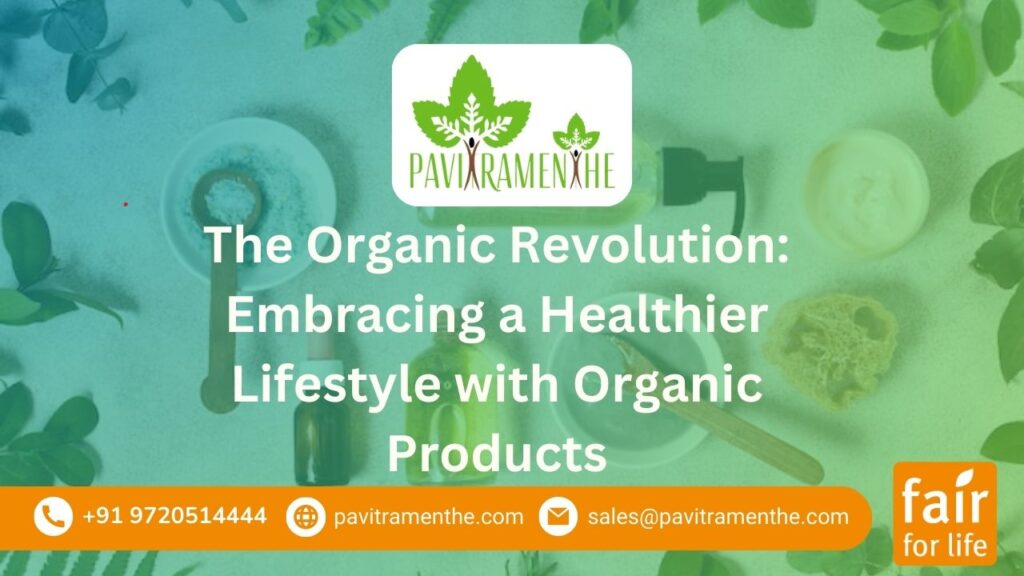Introduction: In today’s fast-paced world, people are becoming increasingly health-conscious and environmentally aware. As a result, the demand for it has surged significantly in recent years. Organic products are not just a trend; they represent a conscious choice toward a healthier and more sustainable lifestyle. In this comprehensive guide, we will delve into the world of organic products, exploring what they are, why they matter, and how they can benefit both individuals and the planet.
it is derived from natural and sustainable farming methods that offer numerous benefits. They are free from harmful pesticides and chemicals, promoting a healthier lifestyle. it farming practices prioritize soil health, biodiversity, and conservation, reducing environmental impact. Choosing it supports local farmers and fosters ethical and transparent food production. From fresh fruits and vegetables to dairy, meat, and even skincare items, the it market is vast and continually expanding. By incorporating it into your daily life, you contribute to a more sustainable and eco-conscious future while enjoying the pure, unadulterated goodness of nature’s bounty.
What Are Organic Products?
These are items that are produced using organic farming practices. Organic farming avoids the use of synthetic chemicals, pesticides, herbicides, and genetically modified organisms (GMOs). Instead, it relies on natural methods to enhance soil fertility, control pests, and promote biodiversity. Organic products can include food, cosmetics, clothing, and household items, all of which adhere to strict it standards and certifications.
Ensuring Authenticity: these are only as good as their certification. Look for well-recognized certifications like USDA Organic, EU Organic, or the Soil Association logo. These certifications guarantee that the product meets rigorous standards.
Also Read: Biodegradable pad distribution by pavitramenthe
Avoiding Greenwashing: In an era where “greenwashing” is common, its certification is your shield against misleading claims. It ensures that what you buy is genuinely it and not just marketed as such for profit.


it offers numerous health benefits:
Free from Harmful Chemicals: its foods are grown without synthetic pesticides and herbicides, reducing your exposure to potentially harmful chemicals.
Nutrient-Rich: Studies have shown that its products can contain higher levels of essential nutrients like vitamins, minerals, and antioxidants.
GMO-Free: these are non-GMO, reducing the risk of consuming genetically modified organisms.
Reduced Chemical Runoff: its farming practices promote healthier soil and reduce the risk of chemical runoff, which can contaminate water sources.
Biodiversity Conservation: its farms tend to support greater biodiversity by avoiding monoculture farming practices and encouraging natural habitats for wildlife.
Lower Carbon Footprint: it is farming often has a lower carbon footprint as it relies less on fossil fuels and synthetic fertilizers.
Supporting Local Economies
Favoring Small-Scale Farmers: Many organic farms are smaller and family-owned, helping to support local economies and communities.
Promoting Sustainable Agriculture: By choosing organic products, consumers contribute to the growth of sustainable agriculture, which can have a positive impact on food security.
Organic Food Categories: in the food industry encompass a wide range of categories:
Organic Fruits and Vegetables: These are among the most popular organic products, with consumers prioritizing pesticide-free produce.
Organic Meat and Dairy: Organic meat and dairy products come from animals raised without synthetic hormones or antibiotics, ensuring higher animal welfare standards.
Organic Grains and Pulses: its grains and legumes are cultivated without synthetic fertilizers, resulting in a cleaner and more sustainable source of carbohydrates and protein.
Enhanced Flavor: Many consumers report that organic foods have a more vibrant and natural flavor compared to conventionally grown counterparts.
Quality Assurance: its food producers prioritize quality over quantity, often resulting in better taste and texture.
Safe for Children and Families
Reduced Exposure to Chemicals: its food is an excellent choice for families, as it reduces children’s exposure to harmful chemicals that can be particularly detrimental to their health.
Allergen Control: its food production can help reduce the risk of cross-contamination with allergens.
Organic Products in the Beauty Industry
Chemical-Free: its cosmetics and skincare products are free from harsh chemicals, making them suitable for sensitive skin types.
Cruelty-Free: its beauty brands are cruelty-free and do not test on animals.
Sustainable Packaging: Organic beauty companies often prioritize eco-friendly packaging to reduce plastic waste.
Skin and Hair Benefits
Gentle on Skin: its skincare products are less likely to cause skin irritation or allergies, making them a safe choice for those with sensitive skin.
Healthy Hair: its hair care products can improve hair health and shine by avoiding sulfates and synthetic additives.
Organic Products for a Sustainable Home
Non-Toxic: its cleaning products are non-toxic and safe for use around children and pets.
Biodegradable: They often feature biodegradable ingredients, reducing their impact on the environment.
Natural Fibers: its clothing is made from natural fibers like organic cotton or hemp, which are grown without synthetic pesticides.
Fair Trade: Many organic clothing brands also prioritize fair labor practices and support ethical manufacturing.
Challenges and Misconceptions
Higher Costs: it can be more expensive due to the cost of organic farming practices, but they offer long-term benefits for both health and the environment.
Availability: While organic products are becoming more widely available, some regions may have limited access to a variety of organic options.
Expiration Dates: they may have shorter shelf lives since they lack chemical preservatives. However, this often reflects their freshness and lack of artificial additives.
Conclusion: In an era where health and environmental concerns are paramount, it provides a path to a healthier and more sustainable lifestyle. Whether it’s the food you eat, the beauty products you use, or the items you bring into your home, choosing organic options can have a positive impact on your well-being and the planet. By supporting organic farming practices and embracing organic products, you are contributing to a greener, cleaner, and more ethical world—one purchase at a time. Make the switch to organic today and experience the myriad benefits it has to offer.

